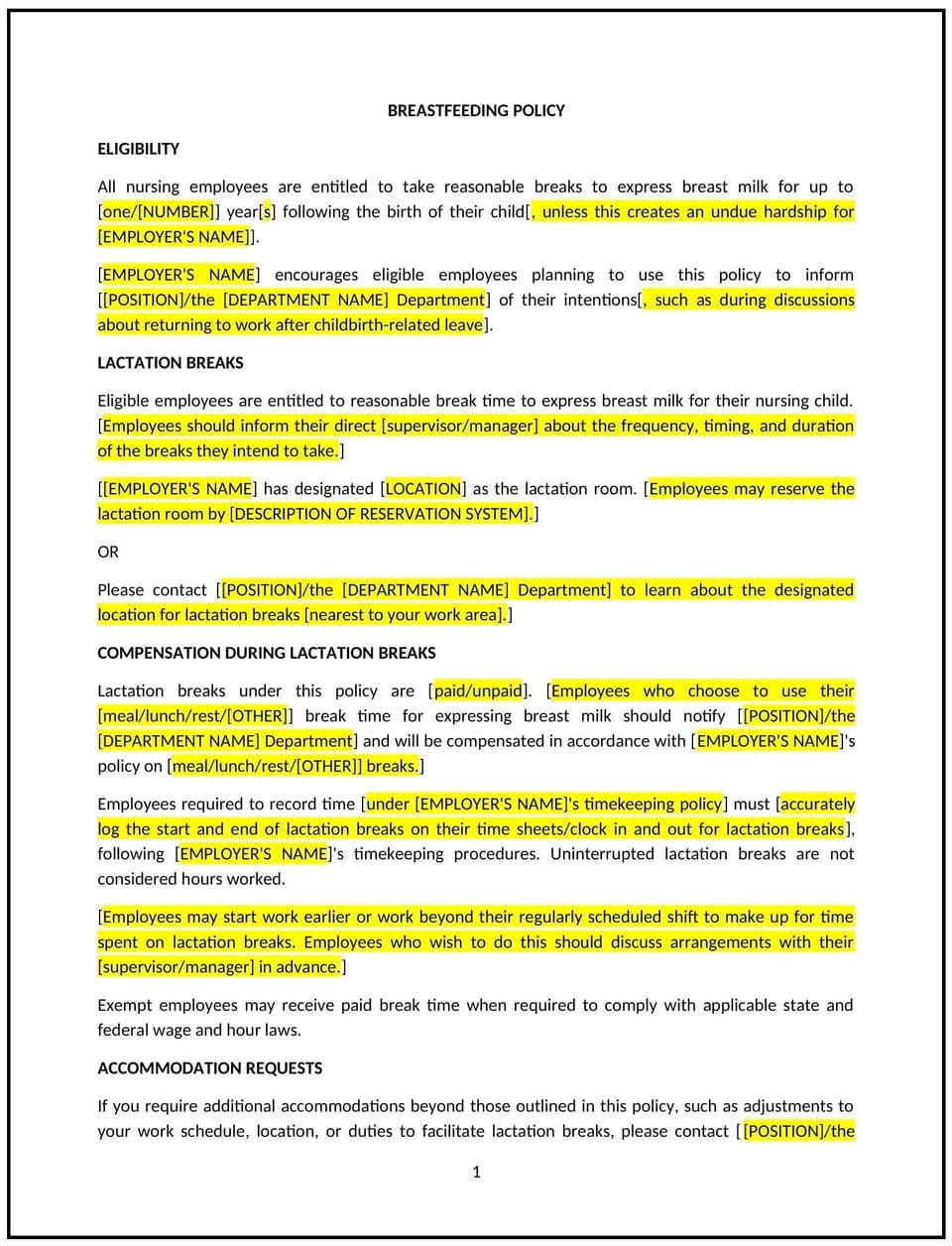Breastfeeding break policy (Iowa): Free template

Breastfeeding break policy (Iowa)
A breastfeeding break policy helps Iowa businesses support nursing employees by providing designated break times and private spaces for expressing milk during work hours. While federal law requires certain employers to provide lactation accommodations, Iowa businesses can establish clear guidelines to create a supportive workplace for new parents.
This policy outlines break time allowances, private space requirements, and expectations for managing breastfeeding accommodations. It helps businesses balance operational needs while promoting employee well-being and retention.
By implementing this policy, businesses in Iowa can support working parents, improve employee satisfaction, and foster a family-friendly work environment.
How to use this breastfeeding break policy (Iowa)
- Define employee eligibility: Specify which employees are eligible for breastfeeding breaks, including full-time and part-time staff.
- Establish break time allowances: Outline how often and how long employees may take breaks for expressing milk.
- Provide a private lactation space: Identify a designated, non-bathroom space that is private, clean, and accessible.
- Set scheduling expectations: Allow flexibility while ensuring minimal disruption to work operations.
- Address storage options: Inform employees whether refrigeration is available for storing expressed milk.
- Maintain confidentiality: Ensure that all breastfeeding accommodations are handled discreetly and professionally.
- Train managers and staff: Educate supervisors on supporting breastfeeding employees and handling accommodation requests.
- Review and update: Periodically assess and modify the policy to reflect workplace needs and employee feedback.
Benefits of using this breastfeeding break policy (Iowa)
This policy offers several advantages for Iowa businesses:
- Supports employee health: Helps nursing employees manage their breastfeeding needs while working.
- Improves workplace morale: Creates an inclusive and family-friendly work environment.
- Reduces employee turnover: Encourages retention by supporting work-life balance for new parents.
- Minimizes disruptions: Provides a structured approach to breastfeeding accommodations.
- Enhances employer reputation: Demonstrates a commitment to employee well-being.
- Promotes productivity: Helps employees return to work with greater focus and confidence.
Tips for using this breastfeeding break policy (Iowa)
- Designate a private lactation space: Businesses should ensure employees have access to a clean, private, and comfortable location.
- Allow reasonable break times: Businesses should provide flexible scheduling for nursing employees to express milk as needed.
- Communicate the policy clearly: Businesses should inform employees of their rights and available accommodations.
- Train supervisors: Businesses should educate managers on how to handle breastfeeding accommodation requests professionally.
- Maintain confidentiality: Businesses should respect employees' privacy regarding their breastfeeding needs.
- Review the policy regularly: Businesses should update the policy as workplace needs and regulations evolve.
Q: Why should Iowa businesses implement a breastfeeding break policy?
A: Businesses should provide breastfeeding accommodations to support working parents, improve retention, and promote workplace inclusivity.
Q: How often should employees be allowed breastfeeding breaks?
A: Businesses should provide reasonable break times based on employee needs, typically two to three times per shift.
Q: What type of lactation space should businesses provide?
A: Businesses should offer a private, non-bathroom space that is clean, comfortable, and free from interruptions.
Q: Can businesses require employees to clock out for breastfeeding breaks?
A: Businesses should determine whether breaks are paid or unpaid, following federal and Iowa workplace guidelines.
Q: How should businesses store expressed milk?
A: Businesses should allow employees to store milk in a designated refrigerator or provide guidance on safe personal storage options.
Q: How can businesses support breastfeeding employees beyond break time?
A: Businesses should promote a supportive culture by providing flexible scheduling, clear policies, and open communication.
Q: What steps should businesses take if an employee requests breastfeeding accommodations?
A: Businesses should discuss the employee’s needs, provide appropriate accommodations, and document the agreement.
Q: How often should businesses review their breastfeeding break policy?
A: Businesses should review the policy annually or as workplace needs and regulations change.
This article contains general legal information and does not contain legal advice. Cobrief is not a law firm or a substitute for an attorney or law firm. The law is complex and changes often. For legal advice, please ask a lawyer.


